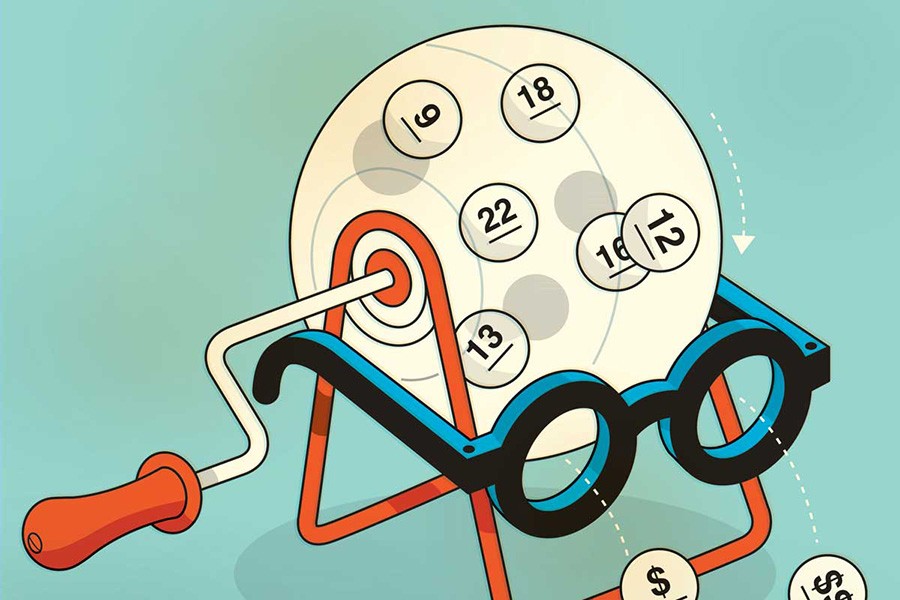To be a good husband, father, and employee, Hyeong Min Kim knows what's expected. He needs to work hard and provide for his family. But every so often Kim's thoughts drift to guitars—Gibson guitars, the ones that cost about $5,000 each. "I'd own 100 guitars if I could," says Kim, an assistant professor of marketing at the Carey Business School. "If I won the lottery, I'd walk into a Guitar Center store and clear the place out."
Jackpot fantasies fuel more than Kim's daydreams. His newest research looks at how playing the lottery changes the way consumers think and act. He found that the mere act of buying a lottery ticket—even when the buyer knows the chance of winning is one in a few million—triggers more materialistic thinking and can make someone throw prudence out the window. "Self-control failure means choosing an immediate reward over a larger, longer-term reward," Kim says. "When people have a chance at a large windfall, say $1 million in lottery winnings, they tend to choose immediate gratification."
To study consumers' thinking, Kim designed four experiments. He brought groups of 50 to 150 New Yorkers into a room to talk about lotteries and shopping. With the first group, he set bowls of M&Ms in the individual cubicles for snacking while participants answered questions about lotteries. In two other groups, Kim quizzed the participants about consumer preferences: Imagine you are shopping for something, he told them, and the store offers you either a $10 instant coupon toward the item or a mail-in rebate for a $20 discount— which would you prefer? He asked the last group to write down specific products or brands they would buy or places they would travel to if they won a lottery jackpot. All four groups had something in common—at the start of the experiments, Kim randomly selected half of the people in each group to receive a lottery ticket, for jackpots ranging from $25,000 to $1 million.
What he found, across all four groups, was less self-control among the lottery ticket holders. They reached for more M&Ms than did those without tickets. They preferred the $10 coupon to the $20 rebate. They would rather buy something (immediate gratification) than take a trip (delayed gratification) if they won the jackpot.
Why does buying a lottery ticket weaken willpower? Typically people suppress fantasies about big-ticket items, Kim says, because they know the dangers of impulse buying and excessive debt. But buying a lottery ticket, no matter how great the odds against winning, seems to stir materialistic thinking—what social scientists call low-level construal. Marketing research has shown that thinking about the tangible details of things—the color of a new car, how the keyboard of a new laptop computer would feel— reduces self-control. Kim says his study shows that playing the lottery can flick on that same mental switch. "Say you're longing for a red BMW sports car. If you bought a $1 lottery ticket, you'd probably tend to think about the concrete details of that car: the colors, how it feels, how it looks." With these features in mind, self-control wanes.
In one of his experiments, Kim also measured participants' materialistic tendencies by using a standard extrinsic-values orientation scale. People who scored low in extrinsic values (that is, not so tied to expensive possessions) wrote thoughts about using a lottery windfall to help their elderly parents or other people in need. "If you give a lottery ticket to a nonmaterialistic person, say a priest or a monk, he likely will not show self-control failure." Asked if this work draws on Buddhist teachings from his native South Korea, Kim laughs. "I'm Catholic," he says, but adds that prayer and meditation in any form lead people away from low-level construal. "To maintain your self-control, you have to live in a higher place, not dwelling on little things. Materialistic things look great but they don't last. You can't extract happiness from extrinsic things."
Kim's lottery study, appearing in the December 2013 Journal of Consumer Research, builds on his research interests in self-control, materialism, and sales promotion. His work was not intended as a critique of lotteries, he says, but as an illustration of societal behavior. "A few times a year, the lottery craze sweeps our country. Last year the jackpot got up to something like $600 million, and Americans spent around $2 billion on Powerball tickets. Probably the overall level of self-control across the country went down quite a bit then."
Kim sheepishly admits that he buys a lottery ticket a few times a year for those large jackpots, with visions of guitars dancing in his head. He designed his lottery research study after his two teenagers pointed out how impatient he'd become at those times—"not on purpose, but because thoughts about the jackpot invaded whatever I was doing with them." His next study? "I'm curious about how not winning the lottery might influence behavior. Ninety-nine point nine percent of us don't win."
Posted in Politics+Society
Tagged lottery, consumer behavior








